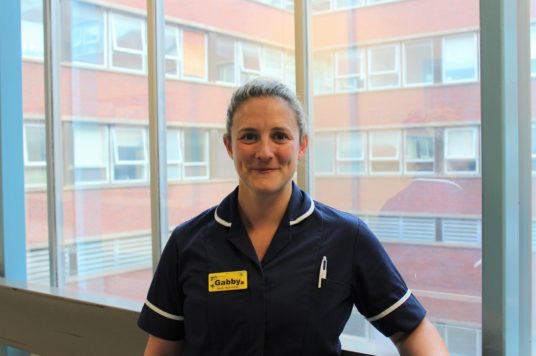First of its kind children’s cancer research nurse role at St George’s
We’re catching up with some of our children’s cancer team to find out more about their roles and why they do what they do.
At St George’s we have over 120,000 visits from children each year, and more than 25 years of expertise caring for children with cancer. That’s why children’s cancer research is so key to us and in improving results for children diagnosed with cancer and treated at St George’s.
First up from our team, Gabby Hermon tells us all about her role in children’s cancer research.
Tell us about your role
I’ve been a Research Nurse for Paediatric Oncology since February and I’m really enjoying it!
I worked on Pinckney Ward – our specialist children’s cancer ward – for six years before this role.
I work across both St George’s and the Royal Marsden and my role was created to increase our capacity for research across the two sites. This is in addition to the already fantastic paediatric research that is currently happening at St George’s, and has done for many years.
What does your day-to-day look like?
Most of my time is spent speaking to families of children undergoing cancer care to share information about paediatric oncology research, answer any questions they may have and provide some support for them too.
I act as a link between the consultant, who does the formal consenting of patients joining trials, and the families involved. It’s a very privileged job to be in and I really love working with children and their families.
When I’m not doing that side of things, I might be found assisting the team taking samples, spinning those samples, undertaking further development or training and helping with the patient case load on the wards – it’s very varied!
So, what does it mean to do research into childhood cancers?
It’s a very sensitive area of work, and it’s ultimately lifesaving for children and how we treat cancer in the future. Research helps us to develop new strategies to advance the treatment of children’s cancer, with aims such as reducing side effects, or finding new targeted therapies for certain cancers. There’s never any pressure for children to take part though, it’s very much a personal choice for each family.
What are you working on at the moment?
At the moment, we are working on a trial for Acute Lymphoblastic Leukaemia (ALL) which is being carried out across Europe, with the aim being to improve treatment of ALL, and reduce the side effects. This is related in particular to our POSCU (paediatric oncology shared care unit) cohort.
What do you most enjoy about your job?
All of it – I love the patient facing side of the role, but I also really enjoy looking at how we can make a difference to children’s cancer care in the future through research.
The research teams at both St George’s and the Royal Marsden are phenomenal, and have given me so much support since I started the role. Having not done research before, it has been a very welcoming team to join. It has been rewarding to be the key link between the two sites, working together on children’s cancer research.
Children’s cancer services at St George’s Hospital are at risk of being relocated to another London location. You can read more about the children’s cancer consultation here.


